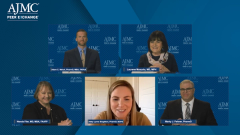
Promoting Awareness for RSV Vaccines: Part 1
The panel offers strategies for being proactive .
Episodes in this series

Adam C. Welch, PharmD, MBA, FAPhA: Patients come to see a physician throughout the year. In the summertime there are no flu thoughts coming around and individuals are generally healthier. So, what conversations can we be having with our staff and our patients in the summer in August and September before RSV [respiratory syncytial virus] season?
Wanda Filer, MD, MBA, FAAFP: I think it’s prepping them, the staff. Making sure we’ve got all our own conversations and questions answered, and that the staff feels comfortable with how we’re going to approach a patient. Maybe I see a patient every 3 to 6 months for their chronic disease management. It depends on what their diagnosis list looks like. I can say to them, “When you come back in September or October, we’re going to be giving you a flu shot; we’re going to be giving you the new RSV vaccine. I want you to read about it.” Here’s some material if I happen to have it. I hope we do. “Here are some things that you need to think about, and I want you to know you can ask any questions you want. But I’m going to strongly encourage you to do this because I want to make sure I can take care of you again next year.”
Marty J. Feltner, PharmD: So, you’re planting the seed now so that when RSV season comes along, they’ll be more informed to decide to get the vaccine.
Wanda Filer, MD, MBA, FAAFP: And you do it in a way that’s respectful and caring. But also, the other thing we’ve found is that any reading materials that you might give them have to be culturally appropriate. So, it’s got to be at the right reading level. I think insurance payers could be helpful there to make sure that materials that are out and that are coming out are appropriate to that patient in their first language of choice. That’s not always easy to do. I worked in one practice where we probably had 25 different languages. And so, finding material that was relevant and on multiple levels is a challenge but it’s never been more important than when you talk about prevention.
Adam C. Welch, PharmD, MBA, FAPhA: Let’s follow up a little bit on that, Dr Singleton. What can insurance payers do now to anticipate that MMWR [Morbidity and Mortality Weekly Report] publication that will come out months down the road from when ACIP [Advisory Committee on Immunization Practices] acts on these RSV vaccines?
Abby Lynne Singleton, PharmD, BCPS: I think the initial data that are coming out from the trials and from the vaccines that are being developed are exciting. I don’t know whether any of you have looked yet but seeing the prevention of the illness and the hospitalizations is really promising.
Adam C. Welch, PharmD, MBA, FAPhA: Dr Feltner, from a pharmacy perspective, what’s a good way to create awareness about these new vaccines as they hit the market?
Marty J. Feltner, PharmD: I just love this question because let’s make it fun. Let’s promote awareness and have fun with your awareness posters bag stuffers, having pop-up windows as I talked about with our computer systems, even going onto a radio station and promoting awareness. I’ve done many radio programs and giving flu shots live on air has been fun too but it’s not a 1-person job to promote awareness. It’s your entire team. It’s your entire company. Everybody must buy in. But have fun promoting awareness. Go on your Facebook page and LinkedIn, promote it that way from a technology standpoint. So, there’s lots of creativity that you need to help promote that new service.
Laurene Mascola, MD, MPH: A lot of persons do look to their public health departments to find out what’s happening and providers know about reporting diseases and go to their webpage. There’s an onus upon the public health departments to start thinking about RSV in the summer and trying to, again, either develop surveillance systems orput those messages out on their webpage about RSV and talking to doctors on how to report RSV, so we start getting some numbers and talking to patients about what diagnostics are available, and educating them along with other areas where individuals are presenting education. The public health departments have an important role.
Wanda Filer, MD, MBA, FAAFP: I would love as a physician to hear from the public health department and for them to say, “Heads up, we’ve got RSV in the community.” Because that allows me to tailor my message to the patient, to say there’s already RSV in my community and so we need to get you protected right now and strike while the iron is hot.
Laurene Mascola, MD, MPH: That’s an excellent thought. Most health departments always announce the first influenza case. We need to start thinking about looking at when is the first RSV case. As I said before, with COVID-19 it’s looking like a yearlong thing and persons really just are thinking, “Oh, it happens every day,” but really with RSV and flu, we do make a specific time frame so we can say, “Oh, flu’s here, you better get your flu shot,” especially for those who’ve not gotten it yet proactively to start getting it now and thinking about it.
The same thing should be happening with RSV infection now that we’ll be having a vaccine. Before, there was no vaccine, so there’s really no need to tell individuals there’s RSV in the community. Wash your hands, stay at home if you’re sick, and all those other standard precautions. But if there is a vaccine that’s available for us starting in June or whatever, we should be starting to tell persons when that first case occurs. That means educating providers to diagnose it and then report it to the health department. Again reporting an RSV infection is important because a lot of patients don’t report to the health department, unfortunately, or they’re too busy. So, we need to have some mechanisms automated lab surveillance, which we do have for certain diseases to make sure that we include RSV detection.
Adam C. Welch, PharmD, MBA, FAPhA: Can awareness go too far? When you think about COVID-19, awareness was everything. It was in the media. It was out there, and individuals have told me, “I’m just done with it. I’m tired. I don’t want to hear about it anymore.” Can we overeducate in anticipation of RSV? Is that a concern?
Wanda Filer, MD, MBA, FAAFP: I think you must be careful. There’s education and then there’s coercion. Particularly for patients who don’t feel empowered, who’ve already felt that the health care system is not advocating truly for them, and who are suspicious of the health care system, you have to be careful that it doesn’t feel coercive. So, meeting that patient where they are and educating them in a language that feels appropriate and understanding, reading their cues to say, OK, they’ve had enough, is important. As a family physician, I get more than 1 shot at it. I can encourage them today; I can encourage them in a few weeks. I might have my office staff say, “Hey, Dr Filer wanted me to call you. Have you considered this? She really would like to have you do this,” without feeling like we’re bullying them. That’s never the intent. The intent is to nudge until it gets done, until the RSV or whatever vaccine or intervention we’re asking them to consider is accomplished.
Transcript edited for clarity.
Newsletter
Stay ahead of policy, cost, and value—subscribe to AJMC for expert insights at the intersection of clinical care and health economics.










